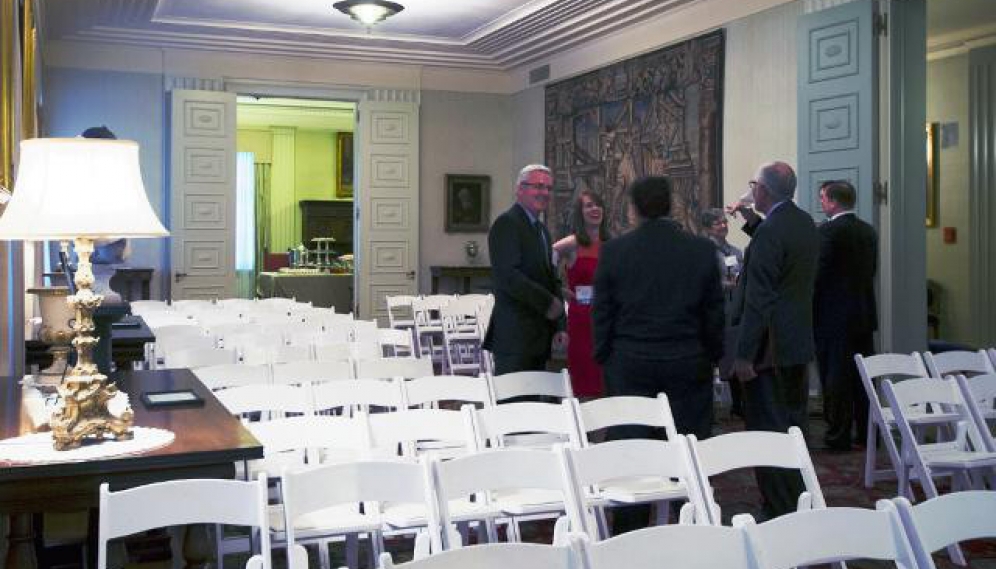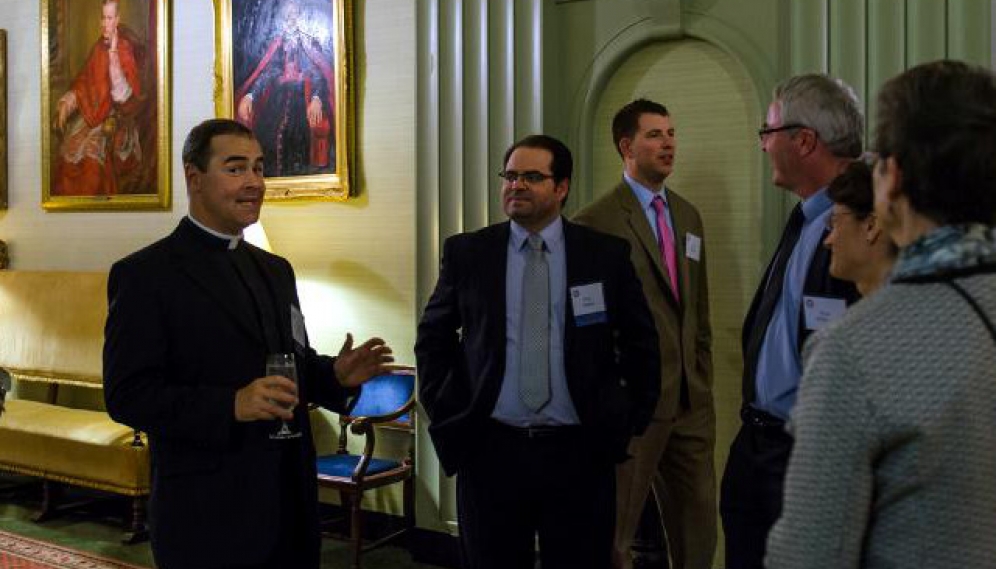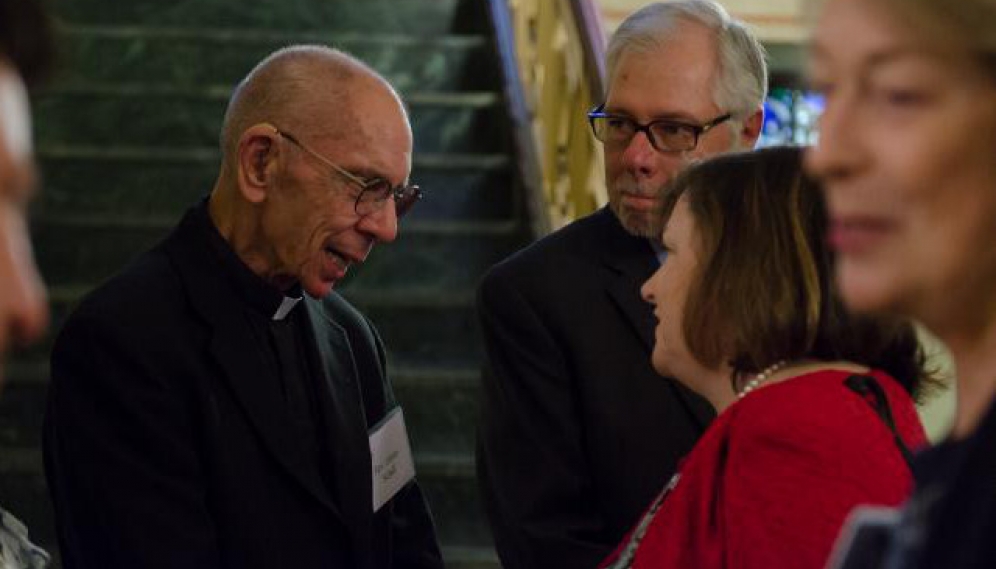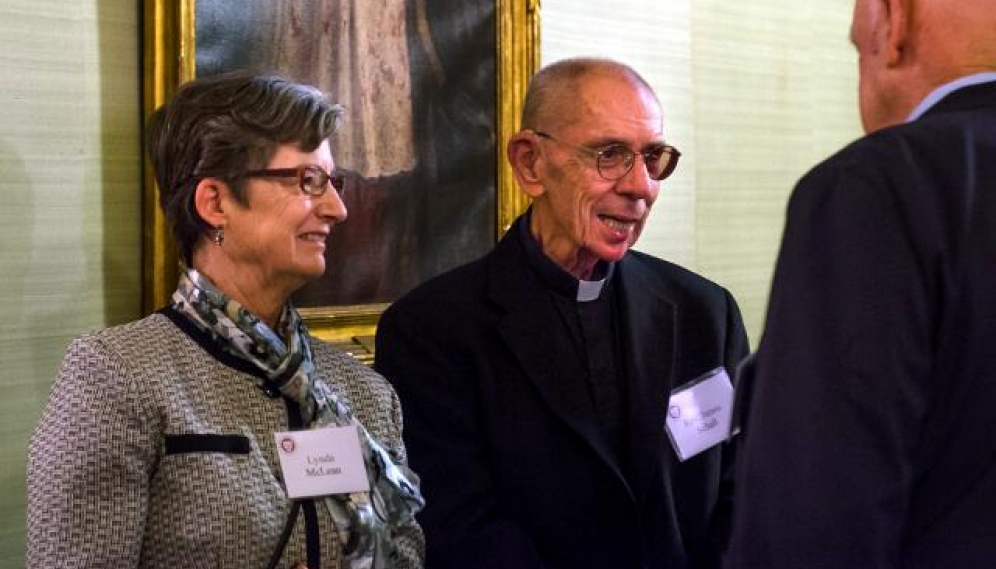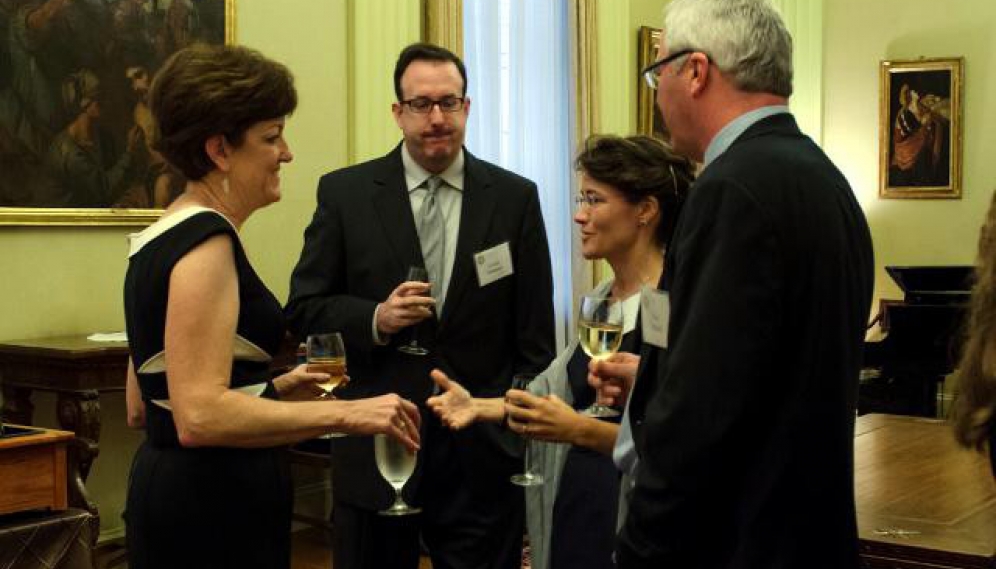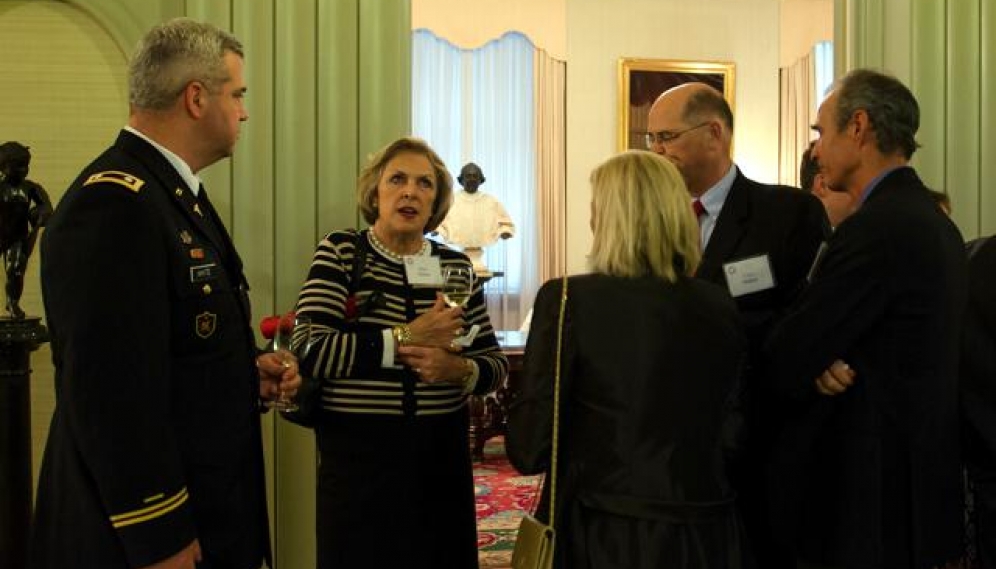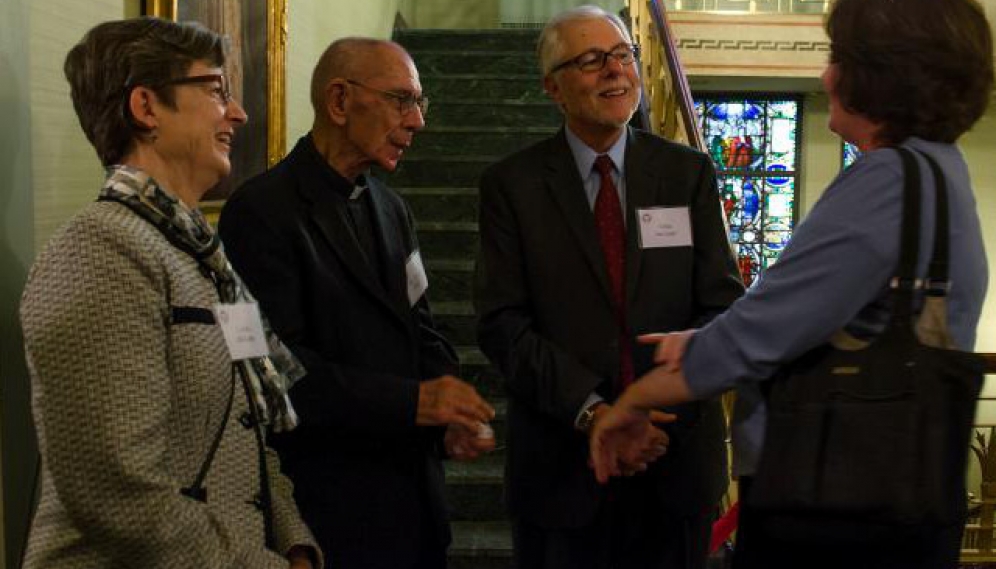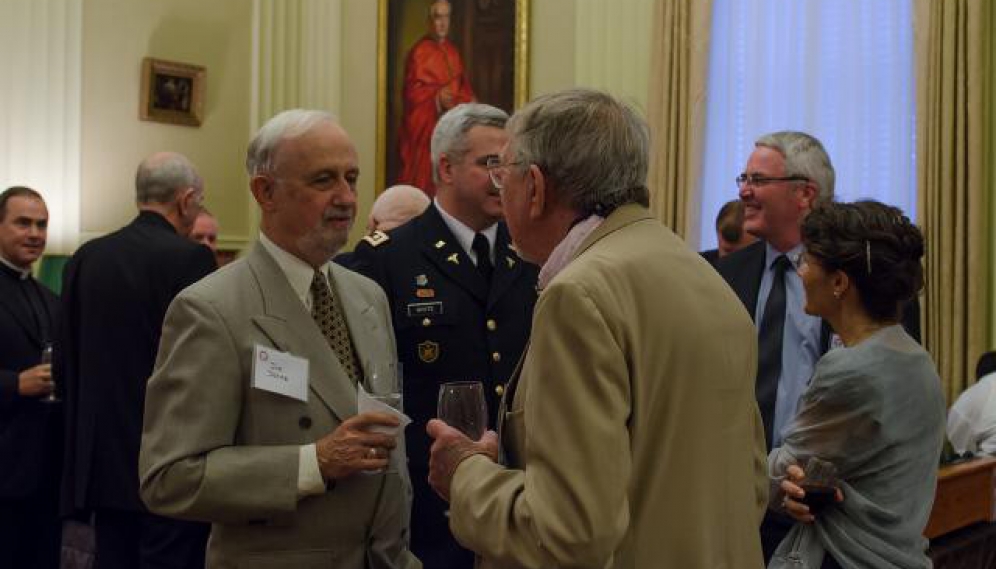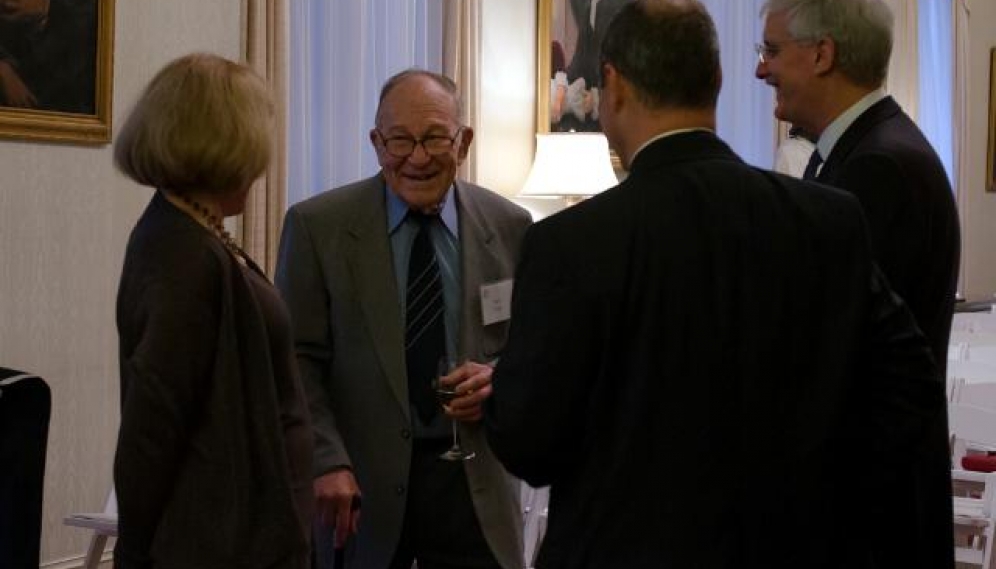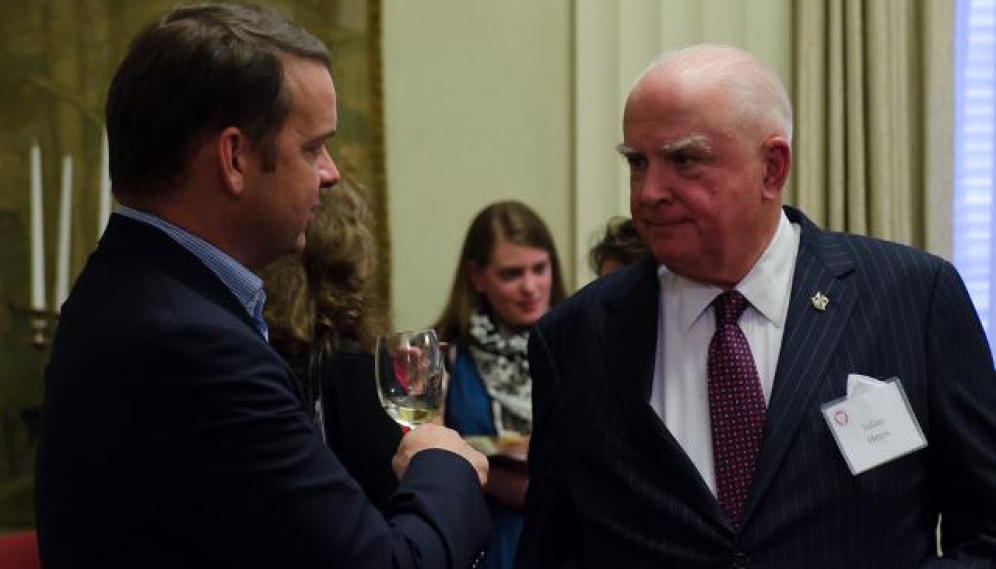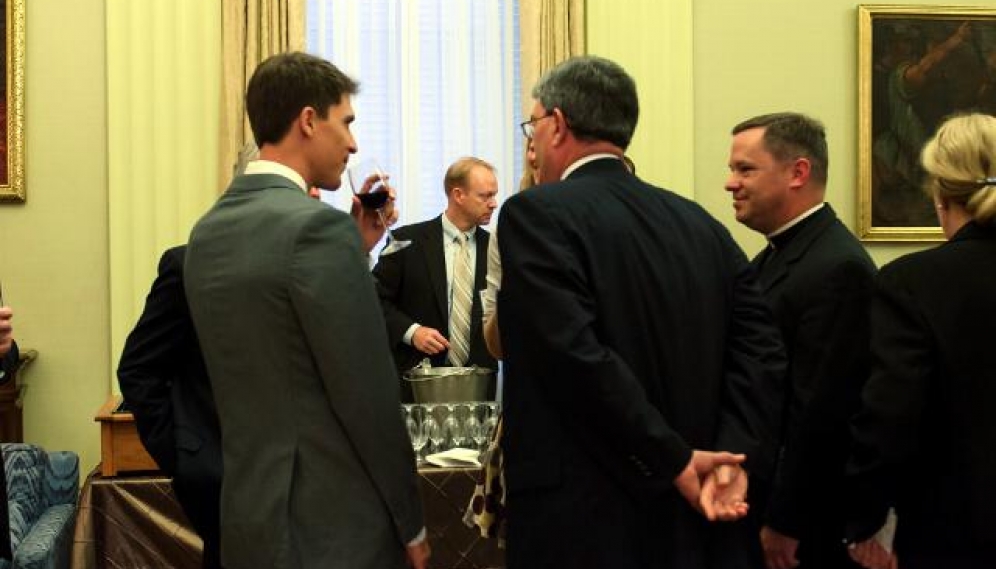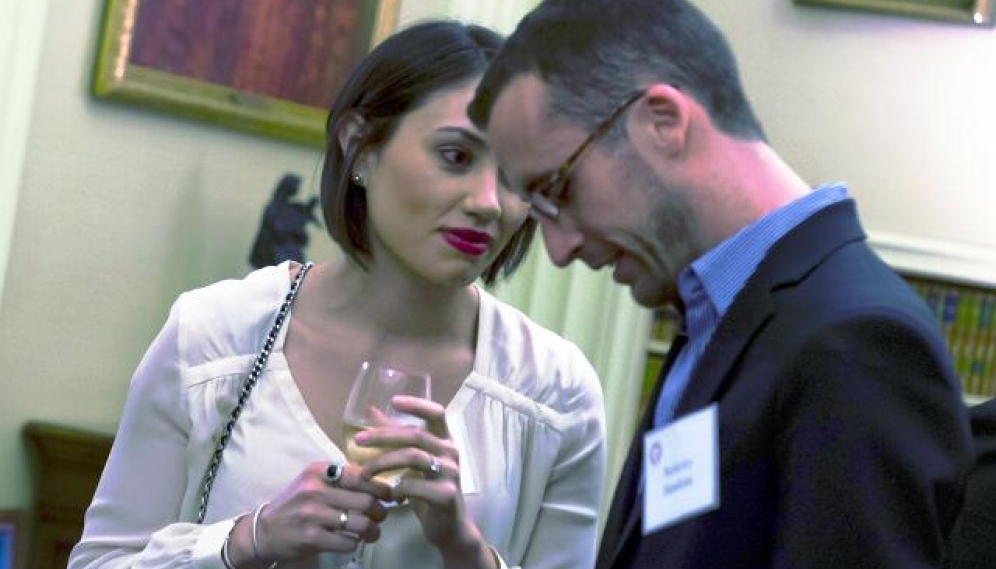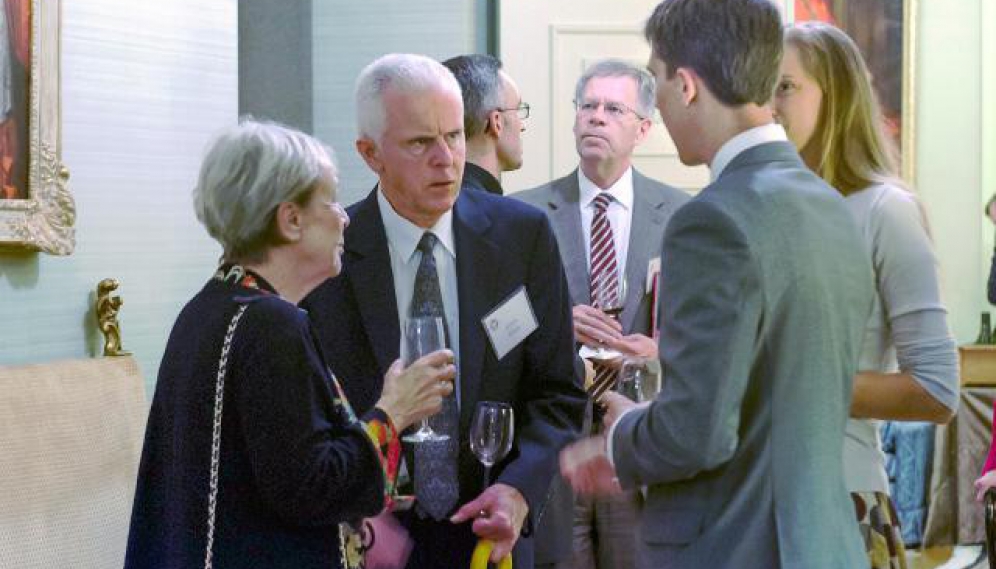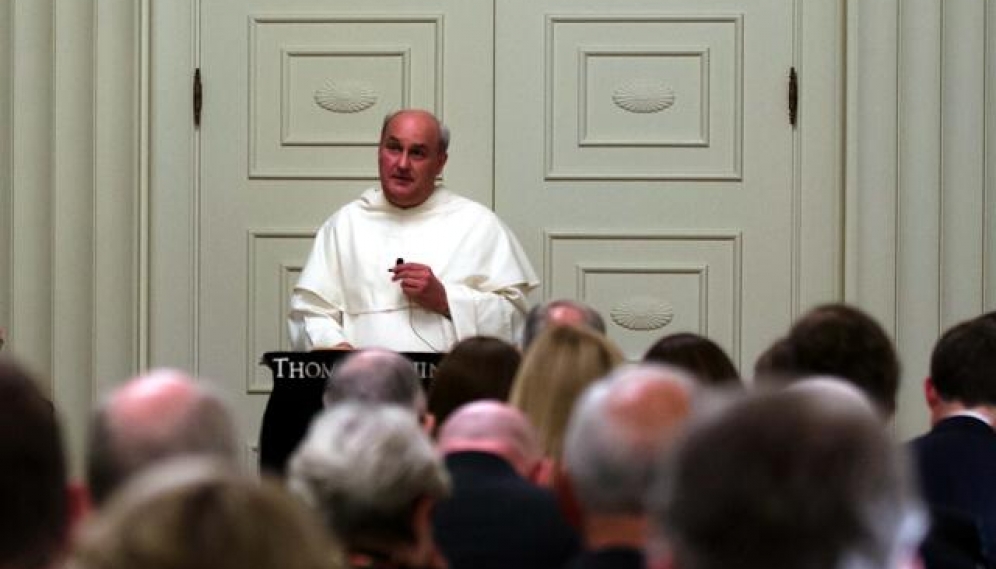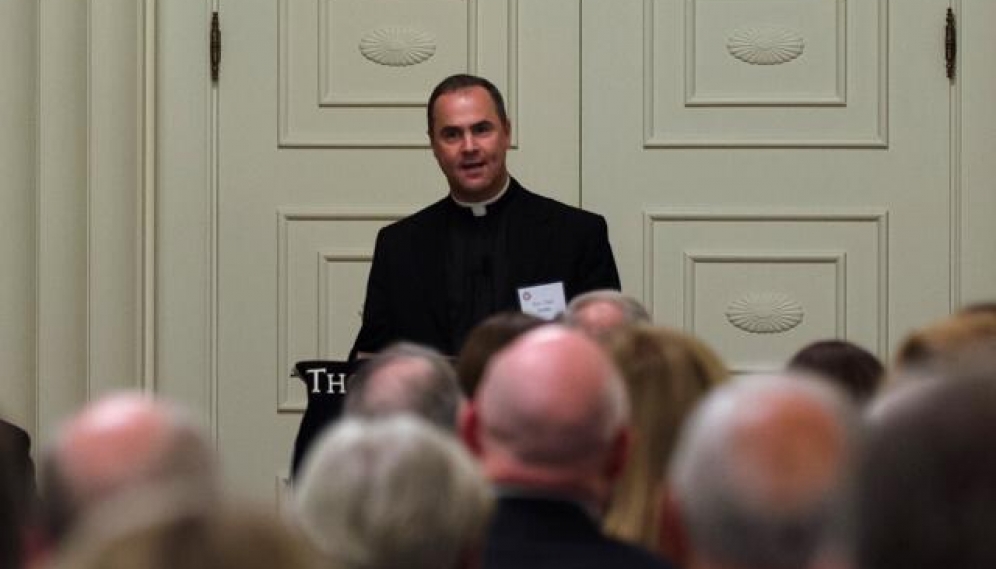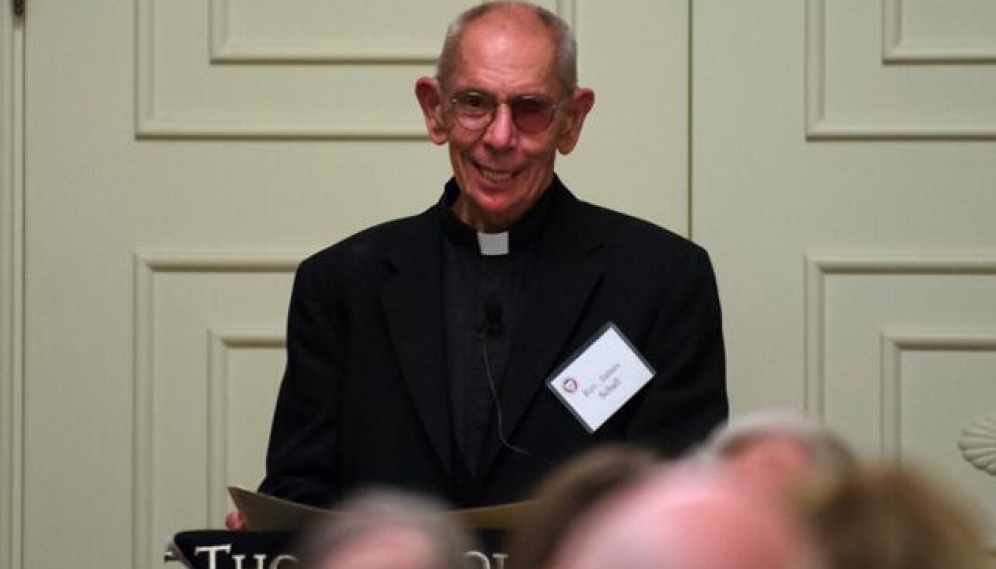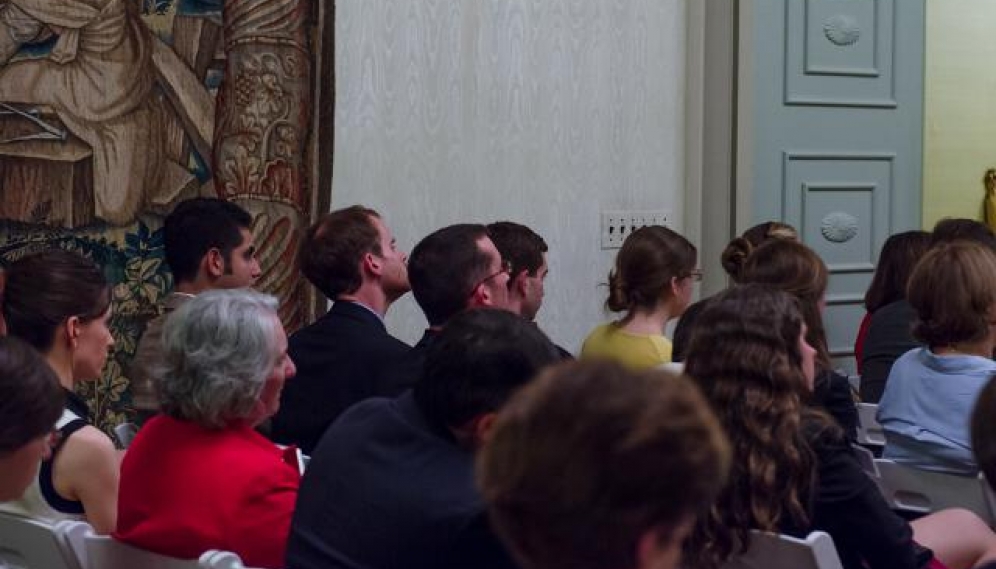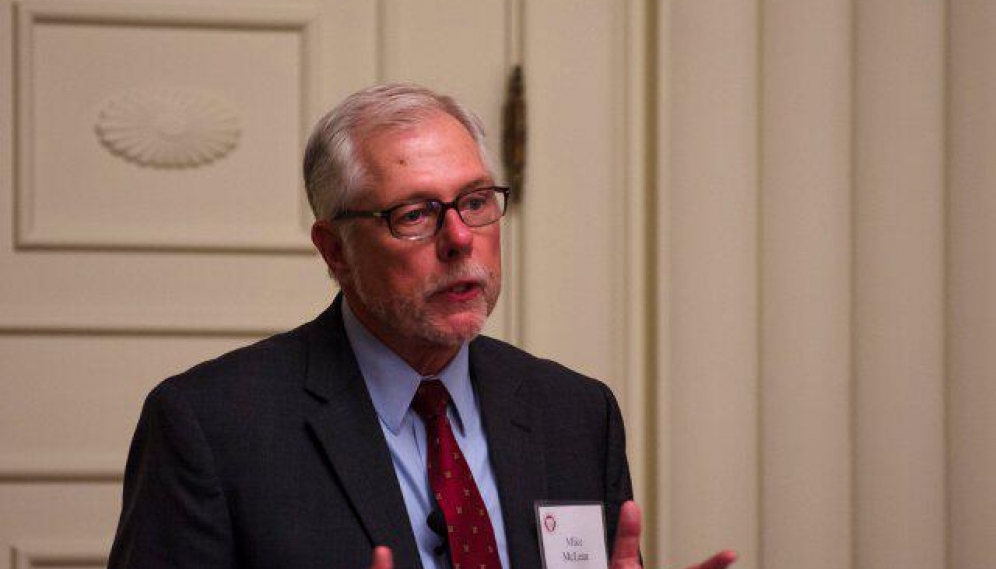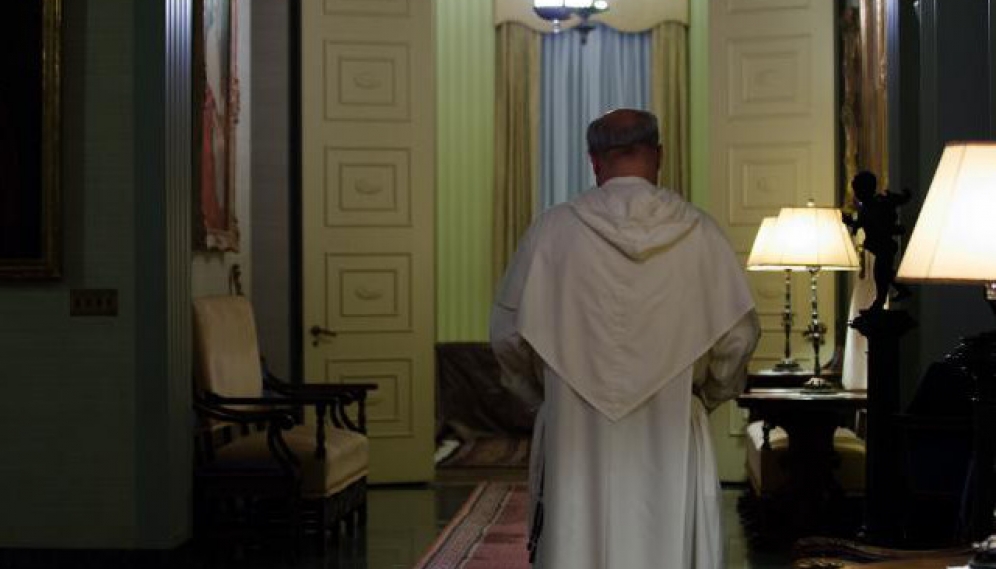- Home
-
About
 Fidelity & Excellence
Fidelity & ExcellenceThomas Aquinas College is unique among American colleges and universities, offering a faithfully Catholic education comprised entirely of the Great Books and classroom discussions.
-
A Liberating Education
 Truth Matters
Truth MattersTruth, and nothing less, sets men free; and because truth is both natural and supernatural, the College’s curriculum aims at both natural and divine wisdom.
-
A Catholic Life
 Under the Light of Faith
Under the Light of FaithThe intellectual tradition and moral teachings of the Catholic Church infuse the whole life of Thomas Aquinas College, illuminating the curriculum and the community alike.
-
Admission & Aid
 Is TAC Right for You?
Is TAC Right for You?Do you enjoy grappling with complex questions? Are you willing to engage in discussions about difficult concepts, with the truth as your ultimate goal?
-
Students & Parents
 Mind, Body & Spirit
Mind, Body & SpiritThere is always something to do at TAC — something worthwhile, something fulfilling, and something geared toward ever-greater spiritual and intellectual growth.
-
Alumni & Careers
 What Can You Do with a Liberal Education?
What Can You Do with a Liberal Education?Nothing speaks more to the versatility of the College’s academic program than the good that our alumni are doing throughout the Church and the world.
- Search
- Giving
Fr. Schall: “On Being Roman Catholic”
By Rev. James V. Schall, S.J.
Emeritus Professor of Political Philosophy
Note: The following text is adapted from an address that Rev. James V. Schall, S.J., delivered at a gathering of Thomas Aquinas College’s Washington, D.C., Board of Regents at the Apostolic Nunciature to the United States on October 3, 2014.
It is an honor and a pleasure to be here, and I wish to thank the members of the Nunciature for their hospitality toward us. Dr. McLean and members of the faculty and Board of Regents of Thomas Aquinas College are here this evening, and it is a pleasure to be with them.
I want to say a couple words about Thomas Aquinas College. Now, I never had the honor or privilege of attending there, but I followed it as it grew and became the school it is. It is probably, in my view, the best school in the country in its own genre. There are not too many that are like it.
I want to say two things about the school, anecdotal things, but to me meaningful. I had lunch one day with Thomas Dillon before he was killed, and at that time I had been reading an essay by Frederick Wilhelmsen called Great Books: The Enemies of Wisdom (PDF) — a great essay. Leo Strauss says basically the same thing. They say that the trouble with great books is the great books contradict each other, and so it is very easy to produce sceptics by reading the great books. I’m little bit of that school myself, and Dillon said to me, “That’s right, however that’s not what we do at Thomas Aquinas College. We have a philosophical background, and we don’t go into reading the great books without knowing something about the philosophy itself.” And that’s typical of Thomas Aquinas College.
The other story is of John Agresto. John Agresto was the president of St. John ’s College in Santa Fe. He’s a man that I’ve known sometime here in Washington. I once asked him about the difference between the students at Santa Fe and the students of Thomas Aquinas. He said, “You know, we’re watching that. I think the the basic difference is the student who graduates from Santa Fe or from St. John’s is tempted to become kind of a Greek philosopher. He is tempted to withdraw into himself a little bit and separate himself from the world, and to follow that kind of vocation.” And there is something to be said for that. He then said, “What is typical of the students of Thomas Aquinas College is — I think because they are Catholic and therefore have this sense of having to go out and evangelize and to explain and do things — is they tend not to just be contemplatives, but contemplatives who in some sense recognize their obligations to others.”
Both of those comments are extremely useful, I think, to understand the mission, if I can put it that way, of Thomas Aquinas College. It’s certainly a place that I have great respect for. Two of my classmates, Fr. Thomas Conn and Fr. Cornelius Michael Buckley, have been chaplains — many of you know them — and unique chaplains really at Thomas Aquinas College, and they’ve always had great affection for the school.
Now I have a short — at least hopefully short, a 24-page essay — here which is called “On Being Roman Catholic.” It’s a lecture, and following on Msgr. Sokolowski’s book about pictures, quotations, and distinctions, the quotation can bring somebody who comes from another place, another time, another era to our attention, and I can incorporate it into what I want to say to you this evening.
Now I want you to listen to these quotations because I think they’re important in their own right, and if you don’t agree with anything I say, you’ll have these to go away with. The first quotation is from St. Athanasius, and it’s from the Breviary for Trinity Sunday. He says:
It will not be out of place to consider the ancient traditions, teaching, and faith of the Catholic Church, which was revealed by the Lord, proclaimed by the Apostles, and guarded by the Fathers. For, upon this faith the Church was built, and if anyone were to lapse from it he would no longer be a Catholic; neither would he be, in fact, a believer.
The second quotation is from Tolkien’s 1927 book called The Silmarillion:
From splendor he fell [that is, Lucifer], through arrogance to contempt for all things save himself, a spirit wasteful and pitiless. Understanding he turned to subtlety in perverting to his own will all that he would use, until he became a liar without shame.
The third quotation is from the Secunda Secundae of the Summa Theologiae St. Thomas says:
After grace had been revealed, both learned and simple folk are bound to explicit faith in the mysteries of Christ, chiefly as regards those which are observed throughout the Church, and publicly proclaimed, such as the articles that refer to The Incarnation.
Now the title of this paper is not John Locke’s The Reasonableness of Christianity; nor is it Ludwig Feuerbach’s The Essence of Christianity, neither of which treatise had much to do with Christianity and, consequently, little to do with reason, in my view. And yet it is more than C.S. Lewis’s Mere Christianity. The reason that properly belongs to Catholicism delights to hear any objection to its truth. Such objections incite us to clarity and to distinction. Catholicism is a revelation confident in its own grounding and coherence. If someone disagrees or disavows it, or any of its basic tenets, he must give a reason for his disagreement. Arguments against Catholicism can, in turn, be evaluated and examined for their own truth content or lack of it. Such objections are indirect teachers of what is true, of what is hidden, and what is perceived. Thinking erroneously is an occasion for thinking correctly. We owe to error the courtesy to find the truth for which it grasps.
Now, Catholicism claims to be true. It is not just another relativism. Thus it cannot avoid dealing with positions that claim it to be false. The title of a book of mine is precisely The Mind That Is Catholic. Catholicism is an intellectual religion. It is not only that, but it is not credible if no case can be made for its validity.
The final words in Chesterton’s 1905 book, Heretics, were that the last defenders of reason in the modern world would be the believers in that distinct revelation that alone is directed to reason. If my understanding of the modern mind is accurate, we have already reached the point that Chesterton saw over 100 years ago. Catholicism almost alone defends reason, and that is based on reality, that is based on what is. We are the last to hold that it is a given world that we do not create out of our own minds, and yet with these same minds we do discover and actualize what is reality. In a world of institutionalized relativism, any claim to truth is chastised as arrogant or fanatic. Catholics seem like braggarts who doubt the modern mind and think that they are full of their own prejudice.
Now, when home television was first becoming common, Lucy is visiting Charlie Brown in his house, and she is in the parlor before the TV set, and she boasts to Charlie, “Our television is bigger than yours.” And Charlie, across the room, good guy that he is, responds, “It is?” And he says, “That’s fine. In fact I hope you enjoy it.” In the next scene Charlie looks at a book ,and Lucy continues to provoke him: “My dad makes more money than your dad. Our house is bigger than your house.” But before a deflated Lucy, Charlie happily explains, “I realize that, and I am very happy for you.” In the final scene Lucy tightens her fists before an uncomprehending Charlie Brown who just doesn’t get it, and she yells at him, “You drive me crazy!”
This claim to truth, both of reason and revelation, does drive the modern world precisely crazy. As implied in John’s Gospel, the truth incites the persecution that Christ told us, His disciples, to expect. Catholicism’s most reasonable teachings sound precisely crazy in the world that denies any order in nature, or in the human being himself, and any order that is placed there. But even the word “crazy” has no meaning if no order or any norm can be found in the world. “Crazy” doesn’t mean anything if there isn’t anything to be crazy about.
Now in the Breviary for Trinity Sunday, as I mentioned, St. Athanasius, who died in 373, speaks of the inner life, the Trinitarian life of the Godhead. This is the teaching that most challenges our reason, to be itself, and to be more reasonable. Athanasius advised us to consider the ancient traditional reading of the Catholic Church. It was revealed by the Lord, proclaimed by the Apostles, and grounded or guarded by the Church Fathers. If we lapse from this teaching, we would not be Catholic either in thought or in name.
We are, no doubt, in a world filled with lapsed Catholics, a world that usually rejects any proposition that even claims to be true. And yet it does not take a genius to grasp why the premise relativism must claim as true is that there is no truth. With this inescapable contradiction we begin our reasoning. It cannot be true that there is no truth if the denial of truth is itself true. Other truths, truth itself, are built precisely on this inescapable principle of contradiction, as the classical writers have always taught us, have always understood.
We are tempted to maximize Church membership — the numbers in the Church — by minimizing what doctrines we believe to be true. Catholicism holds that everything essential that we need to know in revelation is present in the beginning. It is handed down to us with the guarantee of its integrity. Our understanding of what is revealed can deepen. What is revealed remains the same. What does this insistence that we already have what we need to know, what does that mean? It means that thinking about what is revealed makes us more reasonable. This conclusion implies that the origins of reason and revelation are identical. To reject revelation somehow makes us less capable of knowing and seeing reality, of seeing what is true.
From the beginning era we were told what we needed to know for our salvation. God was not negligent by not telling us more than He did. He did not reveal every last detail so that there would be nothing left for us to figure out for ourselves. He left wide spaces for us to use our own brains, and this revelation about God’s inner life, that is the Trinitarian life, was given to us. That is to say, it’s not something we could have figured out by ourselves apparently, and didn’t, although Plato comes pretty close sometimes. As a consequence we also come to know more than we could have known about everything else once we start thinking about how it is possible that the revelation of the Trinity and the Incarnation are not contradictory.
Aquinas tells us that not only is truth revealed but that it is given to both the simple and the learned. Catholicism is not an elitism or a Gnosticism. For every Doctor of the Church, hundreds of ordinary saints can be listed. Catholicism does not presuppose that the simple of our kind know nothing. The Apostles were ordinary fishermen but they were by no means stupid. The mysteries that both the simple and the learned know are to be publicly proclaimed, as Athanasius says, by the Church to the world, especially those teachings that have to do with the Incarnation. That is, Christ is the Son of God, as all available evidence shows, and He actually existed, in this world, as a human being.
I always think that’s why the most important book, in a way, that you can read is Benedict’s Jesus of Nazareth. That book, when you finish reading it, covers all of the bases. What everybody has said for and against the doctrines of Jesus Christ, and all of the responses to the objections, are there. The conclusion of the book is that Jesus Christ was who He said He was. It’s a great book and one not to miss. That quest for understanding, this is why we have this creed, itself a veritable mine of classical thought.
Today every effort is made to render innocuous the differences that exist among the world’s philosophies and religions. We ask how religions are alike, not how they differ, but they do differ. Many want a parliament of religions and not a true church. This sentiment can cow religious people into political uniformity. In one view religion is downplayed because of the various so-called wars of religion. The wars of the early modern period were caused, it was claimed, by religious differences. In both Hobbes and Rousseau the solution was to subject all religions to state power in the name of civil peace. It’s a neat idea. The result elevates economical and material interest over and above anything higher. Men will not have time for, Hobbes will say, or interest in, any transcendent issues; they’re so busy making a living that they don’t dare talk about any differences. And yet, Chesterton said, religions do not differ much in externals. All have similar garb, music, and gestures. They differ in what they hold to be true.
Now religion, thus, must be rendered clawless. Freedom of religion comes to mean merely freedom, abortion — an important evolution in our country, I’m afraid. We can believe whatever outlandish thing we want to believe inside the Church walls, but outside of them we must conform to the state rules. The public works of religion must conform to state laws. These laws, in turn, have no other justification but themselves in their own self-defined statement. Written constitutions to limit government by checks and balances have been rendered practically inoperable. Any natural or transcendent law that always allows appeal of civil law to a higher law is rejected. The state is absolutely sovereign.
The second beginning passage was from Tolkien’s account of the first age, as he called it. Before the coming of men into the universe there was the fall of the angels, or the Ainur, as he called them, especially the Morgoth Bauglir, whom we know as Lucifer. And he had contempt for all things except himself. This is why pride, in a certain sense, has to be pondered again and again and again as the root of all of our disorders. It is the root of our disorders which, in a sense, say, “Yes, when it comes down to the bottom line, it is my law which rules.”
But anyway, he had contempt for all things except for himself. He turned everything to himself to his own purposes. He lied almost about the truth of the things that are.
We are to read literature, it is said, so that we will have explained to us what happens in human nature that we do not yet experience in our own reality, thus when it happens — when we see something happen in our reality that we’ve learned in our literature — we will recognize what is at stake. We find here some relation to the state that lies to us about the nature of our own moral acts. All lies insist that to do what is evil is our right to do. I do not propose here a critique of the absolute state. In St. John’s Gospel we are told the dire things that will happen to the followers of Christ because of what they hold to be true. Many Christians have recently died, as we all know, of persecution.
What is it that I want to say about being Catholic? Walker Percy’s remark — and I got this from a student of mine who is here tonight — is striking. When asked by hostile voices why he became a Catholic, Percy responded, “What else is there?” Catholicism is generally interested in this “what else is there,” as we learn from Plato and Aristotle and Aquinas, and Augustine, too. We do not really understand the full truth of something unless we can explain the arguments against it, which is really Thomas Dillon’s comment about the existence of Thomas Aquinas College. Is science, technology, or some other system a real threat to the validity of Catholicism? Most often, when examined, we can distinguish the truth and falsity of some position which is thought to undermine Catholicism. This effort to understand reasons for its rejection is why Catholicism has always been and must be an intellectual revelation. It recognizes that we do need teachers of wisdom on the human side. Faith is addressed to reason, to a reason that must itself do all it can to be reasonable and to know what is true.
In a book of mine called Rational Pleasures, I recall what Benedict XVI held, namely that the modern world is little more than a gigantic effort to accomplish the transcendental ends of Catholicism, not by grace and faith, but by our own efforts in this world. That’s the thesis of Spe Salvi, which I think is a great encyclical. Marxism maintained that the world is disordered because believers wasted their time with belief and acting in their life, and so therefore they impoverish the world. In practice the opposite really happens. Those who are most concerned with the next life are also usually those who are most likely to be concerned with this life. Catholicism, along with Plato, maintains that what we do, or do not do, in this life is to be judged precisely because of the importance of each actual individual.
The assumption that human happiness is ahead of us in this world has become the real end of our technology and our politics and our economics. The eradication of death, of evil, by economic, political, or technical means, the preservation of the earth for its own sake — these have become the substitutes for Catholicism. These are the idols of our time. It has always struck me as odd, the emphasis that Scripture places on the First Commandment, not to worship false idols, but as it turns out this commandment is the essential one. The unraveling of man’s good — and nature itself — follows from its denial.
Being Roman Catholic, in conclusion, is the great intellectual adventure of mankind. We are invited to participate in it, but we can refuse. It is a realism of its own kind, Catholicism is. It is certainly not liberal, as moderns understand it, nor is it conservative. The way I like to put it, to myself anyway, is that it is Thomist. It gives full credit to reason and to what it can affirm by human powers, but it is also aware that the fall and the consequences of sin are present among us. It sees that the real drama of our lives consists in how we live in whatever polity in which we dwell. The masked, divine plan is overwhelming, and yet it includes individual persons who live in this world, like you and me.
Our final end is not in this world, even though we originate here. As St. Paul says, a divine plan works itself out in this cosmos in which we find ourselves. We are included in this plan, but we are free to reject it. Many seem to do so. We do not underestimate evil, nor make it more powerful than God’s grace. The Church tells us all that we need to know about our final end. The same Church insists that we must use our minds and good sense. We best know that revelation is addressed to us when we realize that we do not know everything by our own powers, and these curious things that we cannot figure out by ourselves, of these things, revelation sheds light onto our minds. It guides us in what we do not know. We learn that God not only exists but that He exists as three persons, one of whom came and dwelt amongst us. He told us everything we need to know to save our souls, and even improve our politics, if we wish. But, we have to live and be open to a gift that we did not ourselves merit.
In the end, all is gift. Nothing needs to exist, and yet it does. To be a Roman Catholic means to be open to this gift and to be charged by it, to understand what we really are: persons invited to live within the inner life of the Godhead. We may accept or reject the invitation in the course of our lives. That, finally, is why we are given our lives — to make this choice. All else perhaps matters, but nothing matters so much.
Born in Pocahontas, Iowa, in 1928, Father Schall holds an MA in Philosophy from Gonzaga University, an MA in Sacred Theology from Santa Clara University, and a PhD in Political Theory from Georgetown University. He served as a professor of political philosophy at Georgetown for 35 years, retiring in 2012.
A prolific writer on culture, social issues, literature, and spirituality, Fr. Schall has authored more than 30 books, 350 essays, 150 book reviews, and 660 columns which appear in Crisis magazine, Gilbert! magazine, the Saint Austin Review, and the University Bookman.
Fr. Schall was the Baccalaureate Mass homilist at Thomas Aquinas College in 1995 and delivered the St. Thomas Day Lecture in 2007. He has been a member of the College’s Board of Visitors since 1997.
About Rev. James V. Schall, S.J.
Born in Pocahontas, Iowa, in 1928, Father Schall holds an MA in Philosophy from Gonzaga University, an MA in Sacred Theology from Santa Clara University, and a PhD in Political Theory from Georgetown University. He served as a professor of political philosophy at Georgetown for 35 years, retiring in 2012.
A prolific writer on culture, social issues, literature, and spirituality, Fr. Schall has authored more than 30 books, 350 essays, 150 book reviews, and 660 columns which appear in Crisis magazine, Gilbert! magazine, the Saint Austin Review, and the University Bookman.
Fr. Schall was the Baccalaureate Mass homilist at Thomas Aquinas College in 1995 and delivered the St. Thomas Day Lecture in 2007. He has been a member of the College’s Board of Visitors since 1997.


